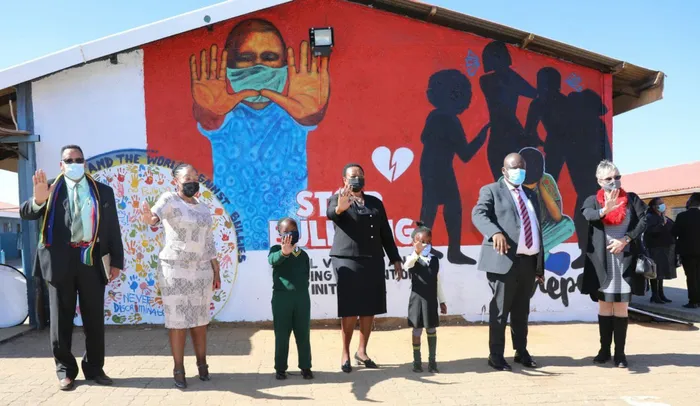School violence: communities in South Africa must play their part

Picture: Supplied - The Department of Basic Education (DBE) launched the school violence and bullying prevention initiative in Orange Farm, Gauteng, South Africa.
Picture: Cindy Waxa - Metro police conduct a search for illegal narcotics at Walmer Secondary School in Cape Town. The writer says violence in schools is on the rise.
By Hendrick Makaneta
The level of school violence in South Africa has now reached alarming proportions. Recent violent confrontations involving learners, particularly in Gauteng and KwaZulu-Natal, have once again highlighted the issue of school safety.
Perhaps we should start by condemning the violence directed at teachers in the strongest possible terms. No teacher deserves to be stabbed by a learner. Such acts only bring pain and misery to society at large.
The key question that must be answered by all of us is: What will be the consequences of not successfully addressing these high levels of violence in the terrain of education?
The increasing levels of school violence pose a real threat to learning and teaching. Imagine student teachers at our institutions of higher learning who, in addition to their academic work, must grapple with news about the learners who stab and kill teachers, particularly in schools in townships. Teachers are slowly but surely losing the plot where learner discipline is concerned.
One of the reasons why corporal punishment was abolished in schools was that South Africa could not afford to raise children who were subjected to violence by teachers as violence breeds violence. Experts have also said that children who are subjected to violence turn out to be violent.
I must say that despite the abolishment of corporal punishment many years ago, it appears that today’s generation of learners is becoming more and more violent. We are talking here about learners who have not experienced corporal punishment in schools, yet they are among the ones who allegedly attack and kill teachers. Why is today’s generation of learners violent despite learning in a classroom that is non-violent?
The only way to curb school violence is for the government to consider alternative ways as the current approach is not working at all.
It can’t be correct that society is fast losing confidence in public schools. Even people who struggle to make ends meet have lost confidence in them because there is no guarantee their loved ones will come back alive.
The government should move swiftly to enforce safety measures not only at schools but in the broader society. It must address crime in communities as this spills into schools. But at the same time, society must realise that the government alone will not be able to curb the crime and violence that emanates from our communities.

Society must play an active role and take charge of the future. Learners are members of communities. Blaming only learners for the high rate of school violence cannot resolve the safety issues in the terrain of education. We must go back to the roots where it really “takes a village to raise a child”. It starts in our streets.
We as members of communities, collaborating with law enforcement agencies, should ensure that every street in our country is safe. A strong collaborative effort between parents and teachers is a requirement for safer classrooms and by extension safer schools. But at the same time, we should encourage more and more unannounced search-and-seizure operations in problematic schools.
Learners must know that they cannot do as they please.
The state has a duty to protect our learners and teachers from unruly elements. Whereas we should applaud efforts by the state to put in place plans to eradicate violence in schools, we must also acknowledge that such plans have not worked as violence continues to be with us despite the summits to address this and the plans that were made.
We have heard enough of violence in our schools. Unsafe schools cannot be productive because teachers are unable to properly focus on their day-to-day business effectively. Unfortunately, we have parents who have given up on their children and have left the issue of discipline in the hands of teachers.
The reality is that teachers can hardly succeed where parents have failed as proper discipline starts at home. It should be clear at this point that the government cannot continue on the current trajectory if we are to succeed in rooting out criminal conduct in schools.
There is no need to spend more time planning and preparing without much action.
As activists in education, we cannot fold our arms and watch when teachers are attacked and lose their lives at the hands of ill-disciplined learners. We owe it to society to lend a hand of support and to create a conducive environment for learning and teaching.
Working with the government and other civil society organisations, we should always strive to rid our schools of violence for the well-being of an African child. The only way to succeed in this noble effort is if we all get involved.
Makaneta is an education activist who is completing an LLB degree with the University of Pretoria
Related Topics: